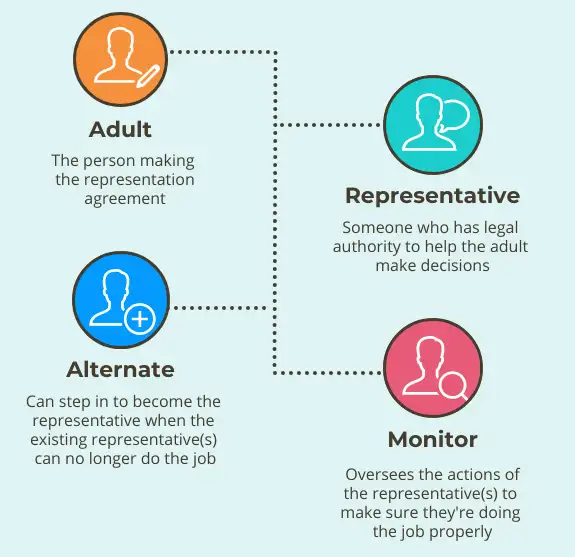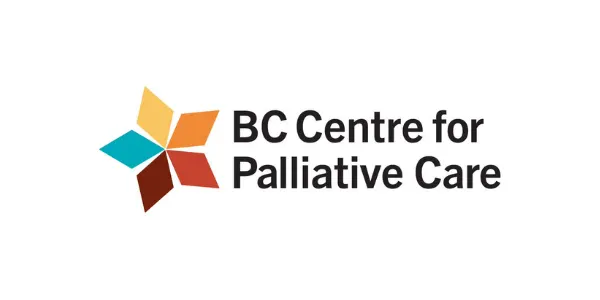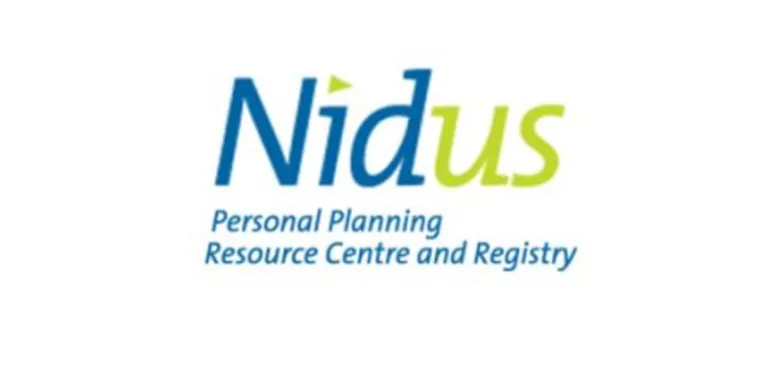
With the power of attorney I already made, can my attorney make medical decisions for me?
One day, you might become unable to make decisions for yourself — important decisions about your body and your health care. There’s a legal document you can sign to authorize someone to make these decisions for you. Learn how to prepare an enhanced representation agreement, and your rights once you have one in place.
What you should know
“My grandpa is 94 and has severe dementia. He needs help with everything: walking, eating, bathing, dressing. Before he got sick, he told me ‘Don’t let them tube feed me for any prolonged period of time. That’s no way to live!’ As his chosen representative, I can talk with his care home about the kind of personal care he would have wanted. I can also make health care decisions, as they arise.”
– Ali, West Vancouver, BC

An enhanced representation agreement (often called a section 9 representation agreement) lets you choose someone to make legally binding health care and personal care decisions for you.
The person you choose is called your representative. This should be someone you trust. After all, you’re authorizing them to make critical decisions about your body and wellbeing, if you’re not capable of making them yourself.
Health care entails anything done for a therapeutic, preventive, palliative, diagnostic or cosmetic purpose. Big and small health care decisions are covered. If you’re not capable of giving consent to health care treatment, your representative can give or refuse consent on your behalf.
Personal care includes diet, dress, social activities, exercise, spiritual matters, as well as where you live and work and who you spend time with. Personal care becomes especially important if you develop a chronic illness or condition (such as dementia), or you’re moving into a care facility.
Financial and legal matters
Enhanced representation agreements don’t cover financial and legal matters. Most capable adults prepare an enduring power of attorney to plan for their financial and legal affairs.
You can make an enhanced representation agreement if you are:
aged 19 years or older, and
capable.
The law says you’re legally capable of making an enhanced representation agreement if you can understand the nature and consequences of the proposed agreement. This means you must understand:
that you’re giving power to someone else to make decisions for you,
the kinds of decisions you’re asking your representative to make, and
the consequences of giving someone this power.
For example, your enhanced representation agreement may allow your representative to say no to life-supporting treatment. You must understand that this might happen and that, consequently, you could die.
Capability shouldn’t be based solely on a diagnosis or IQ. And the law says it cannot be based on the way someone communicates.
If you have diminished capacity
The best time to prepare an enhanced representation agreement is before a health crisis occurs. However, if you haven’t planned and have diminished capacity, you may still be able to prepare a standard representation agreement.
Deciding who will be your representative(s) is a very personal decision. Most people choose their spouse, a family member or a friend. But you can choose anyone, as long as they’re 19 years or older.
Who cannot be your representative
There are a few exceptions. Your representative cannot be:
a paid caregiver, or
an employee at a facility where you live if the facility provides personal or health care services.
These restrictions don’t apply if the person providing the care or working at the facility is your child, parent or spouse.
You can choose more than one representative
“When we first had ‘the talk’ about end-of-life care, Mom wasn’t wild about singling out specific family members to take the lead. But Mom’s lawyer reminded her of an important point. If something happened to her, only one person would, by default, be asked to make medical decisions for her anyway. Mom’s lawyer tailored the agreement to reflect Mom’s preferences. In her representation agreement, Mom appointed four family members to make decisions by majority rules. When she got really sick, everyone knew what to do.”
– Akal, Chilliwack, BC

You can choose:
Different people to make different kinds of decisions. Sam can make personal care decisions for you and Jo can make health care decisions.
Two or more people to make the same kind of decision. Sam, Jo and Ron can make your health care decisions together. The document might say:
They must make decisions unanimously (the three of them must agree). If your agreement doesn’t say how decisions should be made, they must be made unanimously.
They can make decisions by consensus. Sam and Jo agree. Ron disagrees. If Ron can voice his displeasure but agree not to stand in the way of Sam and Jo, there’s still a consensus to proceed.
Each of them can make decisions independently.
The majority rules. Sam and Ron agree, Jo does not. The decision goes Sam and Ron’s way.
They must consult with all family members to get family consent: unanimously, by majority, or a consensus decision.
You should consider either or both of:
choosing an alternate representative — someone who can step in if your first choice can no longer act
appointing a monitor to keep an eye on your representative(s)

“My brother Simon has dementia. It can make him aggressive. Last week he needed urgent treatment for an infection, but he was in one of his moods. Whenever the nurse approached, he’d shout ‘get lost!’ and try to push her away. I knew it was the dementia speaking. The nurse had to get help holding him down to put his IV line in — Simon wasn’t happy. As his representative, I had to tell the nurse it was okay to do this. Under an enhanced representation agreement, Simon had given me general powers.”
– Neve, Cranbrook, BC

An enhanced representation agreement covers health care and personal care decisions.
The extent of your representative’s authority will depend on what your agreement says. This means that you decide what power to give them:
The law says you can give your representative general power to do anything they consider necessary in relation to your health care or personal care. It’s important to appreciate how broad this general power is. It includes the authority to refuse medical treatment, even if it could prolong your life. It also includes the authority to physically restrain, manage or move you if it’s necessary to do so for medical treatment — even if you object at the time.
Or you can give your representative specific powers. You might only want them to do certain things. The law sets out what things you can specifically give your representative authority to do. For example, you might say in your agreement that your representative is only allowed to give (or refuse) consent to a specific health care treatment in specific circumstances.
Keep in mind
If you choose to limit your representative’s powers, you should know who might be asked to make medical decisions for you that are beyond the scope of your representative’s authority.
There are certain things your representative can’t do unless you say they can in your representation agreement. This applies whether you give them general or specific powers. Unless you specifically say they can, your representative cannot:
give or refuse consent on your behalf to certain kinds of health care,
make arrangements for the temporary care and education of your dependants (such as minor children), or
interfere with your religious practices.
A representative has certain legal duties. For example, they’re obliged to act honestly and in good faith. They must also act within the authority granted to them by the representation agreement.
When making decisions, your representative must (in this order):
Determine and comply with your current wishes, if it’s reasonable to do so.
Comply with the wishes you expressed when you were capable.
If your wishes are not known, act based on your known beliefs and values.
If your beliefs, values and wishes are not known, act in your best interests.
More on the representative’s duties
Nidus Personal Planning Resource Centre and Registry has a fact sheet on the roles and responsibilities of a representative.
Usually, an enhanced representation agreement becomes effective as soon as it’s signed. Or you can say in your agreement when you want it to become effective.
As long as you're capable, you remain in charge
Even if you have a representation agreement in place, a doctor or other health care provider must always check with you before taking any action. If you’re capable of making the decision, they must obtain informed consent from you. Your representative can’t override your decisions as long as you’re still capable.
There are different ways an enhanced representation agreement can end:
When you die.
A committee of person is appointed to make health care decisions for you.
Your representative is your spouse and your relationship ends (unless the agreement says otherwise).
Your representative dies or becomes mentally incapable (unless you have another representative or an alternate representative).
You revoke — that is, cancel — it. You can revoke an enhanced representation agreement at any time, as long as you’re still legally capable. Learn more about how to cancel an enhanced representation agreement.
Prepare your enhanced representation agreement
“I thought the decision to choose a representative would be a no-brainer: my wife, Maria! But Maria told me she’d never be able to bring herself to unhook me from any machines, even if it meant l’d be a vegetable for years and years. This isn’t what I want. My son’s attitude gave me more comfort. He said ‘I hear what’s important to you, Dad. I know I’ll need to consider your condition, your chances for recovery, and what you would have wanted.’ I chose my son to be my representative.”
– Daniel, Vancouver, BC

Choosing your representative is an important decision and it's not always easy. Most people ask a family member or close friend. You’re giving your representative significant powers and responsibilities. Think about what you’re asking of your representative and who might be up for the job.
Key considerations
Important things to consider when choosing a representative include:
Loyalty. Will the person you choose ensure that your needs and wishes — not theirs — come first? Take the time to talk with your candidate about what you want and would expect of them.
Trust. The most important thing is to choose someone you trust. Your representative can make life-and-death choices on your behalf. They will make critical decisions about your health and your body that will directly impact your wellbeing and quality of life.
Ability. Are they able to communicate clearly? Could they make difficult decisions in stressful situations? Will they understand the medical options involved?
Willingness. Your representative should be interested and involved. Ideally, they’ll take the time to learn your medical history and preferences for care. They’ll need to review the treatment options with your health care provider. Be sure they’re comfortable taking on this important role.
Age and proximity. Your representative must be at least 19 years old. Choose someone who can be responsive to your needs as they arise.
You can go with a team approach if you wish
If you want to appoint more than one representative, you should think about:
Relationship dynamics. Will the representatives you choose be able to make decisions together? Do you want your representation agreement to reflect the decision-making dynamics of your family?
How you’d like decisions to be made. Decisions can be made in a number of ways. You might want decisions to be made unanimously, independently, or somewhere in between. We explore more of these options above, under what you should know.
Weighing the pros and cons
There are good reasons to let your representatives make decisions independently. Say one representative is on vacation; progress won’t get stalled just because they’re temporarily unavailable. On the other hand, requiring your representatives to make decisions together means there’s always a “double check” on decisions made on your behalf.
The skills and qualities of each individual representative. Think carefully about what you’ll be asking each of your representatives to do. Are they fit for the job?
“My sister Jada told me she doesn’t want the responsibility of making medical decisions for me. But I can’t think of anyone better to make my personal care decisions for me. She’s compassionate, has a good head on her shoulders, and knows me well. She’s the kind of person who gets along with everyone. I know she’ll create strong positive relationships with my caregivers, but won’t be afraid to speak her mind. She’ll be a great advocate for me.”
– Nia, Coquitlam, BC

Consider appointing an alternate and a monitor
If you only name one representative, consider also naming an alternate representative. An alternate can take over if something happens to your first representative. You need to clearly describe the circumstances in which an alternate can step in.
If you've named several representatives who must make decisions together, consider what you want to happen when one of them becomes unable or unwilling to continue acting. Spell out what you'd want to happen in your agreement.
You can also appoint a monitor. A monitor acts as a safeguard against improper behaviour. They oversee the activities of your representative.
Support for your representative and monitor
Provide your representative(s) and any alternate with a copy of the Nidus fact sheet on the role of a representative. If you appoint a monitor, provide them with a copy of the fact sheet on the role of a monitor.
You can give your representative general power to do anything they consider necessary in relation to your health care or personal care, or you can give them specific powers. Revisit the section above on the representative’s powers, under what you should know, to refresh your understanding of what specific powers you can give to your representative.
You can ask a notary public or a lawyer to prepare your enhanced representation agreement — but you don’t have to.
If you decide to see a professional, phone around and compare prices. See the options for free or low-cost legal help.
Enhanced representation agreement forms
If you're open to preparing your own representation agreement, there are free forms available.
The BC government provides an enhanced representation agreement form, with instructions on how to fill it out.
Nidus Personal Planning Resource Centre has an enhanced representation agreement form (they call it a "basic RA9 form"), with detailed instructions on how to fill it out.
For an enhanced representation agreement to be effective, it has to be signed and witnessed properly.
You must sign the agreement
You must sign and date the agreement in front of two witnesses. The witnesses must also sign and date the agreement in front of you. One witness is sufficient if they are a notary public or a lawyer.
Witnessing can now be done electronically. That is, you can sign in each others’ electronic presence. There are a few requirements for electronic witnessing to be valid:
The witness must be a notary or a lawyer.
You must use audiovisual communication technology (such as Zoom or Facetime) that allows you to hear and see each other.
You must be able to communicate simultaneously, in a way that is similar to communication that would occur if you were physically present together.
You must sign and date complete and identical paper copies of the representation agreement.
You must include a statement that it was signed and dated in accordance with the alternative process provided in the Representation Agreement Regulation.
Here’s an example of what electronic witnessing might look like:
You and a notary or lawyer connect on a video call.
Each of you has an identical paper copy of the representation agreement.
You adjust your cameras to ensure that you can both see each other’s face at the same time as seeing each other sign the representation agreement.
The lawyer or notary watches you sign and date the representation agreement.
You watch the lawyer or notary sign the representation agreement.
After signing, you and the lawyer or notary discuss your plan to bring the signed representation agreement pages together to form the complete document. For example, you can mail or courier your originally signed page to the lawyer or notary. They can then put it together with their original signed witness page, along with the rest of the representation agreement.
If someone is signing the representation agreement on your behalf, you must be in each other’s physical presence when they sign the representation agreement. The lawyer or notary witness may be in the electronic presence of you and the person signing on your behalf.
Who can be a witness
A person can’t witness a signature if they are:
a representative,
an alternate representative,
a spouse, child or parent of a representative or alternate, or
employed by a representative, unless you’re appointing a lawyer, notary public, or the Public Guardian and Trustee as your representative.
Your representative must sign the agreement
Your representative (including any alternates) must sign the enhanced representation agreement. If you have more than one representative, each must sign the document before they can act. But your representatives don’t all have to sign at the same time. And their signatures don’t need to be witnessed.
If you appoint a monitor
A monitor must complete and sign a certificate of monitor. A version of this form is available here.
Your agreement will be most effective if your representative knows what you want. They’re required by law to take your known wishes, values, and beliefs into account when they make decisions for you. So once you’ve both signed the agreement, sit down and talk to them! If your representative doesn’t know your wishes, values, or preferences, then they’re required to make a decision that’s in your best interests.
There are certain documents (other than representation agreements and advance directives) that you can use to express your wishes and values. These documents can’t substitute for your consent if you’re incapable. But they’re useful for facilitating conversations about your values, wishes and beliefs. Think about:
Do you have personal beliefs that would influence your healthcare wishes?
Where would you want to be cared for?
Are there any conditions under which you do or don’t want to receive certain treatments?
If you’re a healthy adult with no red flags in your family history, conversations about general values (“I’m most concerned about losing quality of life”) and preferences (“I don’t want to be hooked up to machines”) will be useful. Be clear about what these statements really mean to you. Learn as much as you can about the possible health care treatments that might be offered to you at end-of-life.
For adults with a specific diagnosis or at end-of-life, talk about your wishes in your particular circumstance. Keep your representative updated on your condition and possible treatments.
You can find links to helpful resources in the who can help section below.
You can choose to register your enhanced representation agreement with the Nidus Personal Planning Registry. This is a centralized registry for storing representation agreements and other personal planning documents.
Registering your document will act as a safeguard. You can permit trusted institutions and individuals to access your registered documents. For example, quick access to documents may be needed in emergency situations.
Common questions
There are two kinds of representation agreements. The right fit for you will depend on your circumstances. Learn about the differences between the two types of representation agreements.
The law says you cannot pay your representative to make health care decisions for you. If you want to pay your representative to make personal care decisions for you, it must say so in the agreement and it must be approved by the Supreme Court of BC.
Representatives, alternates and monitors are entitled to be reimbursed for reasonable out-of-pocket expenses they paid when acting under the agreement.
There’s a hierarchy of authority that a health care provider must follow if a decision needs to be made and you can’t make it yourself. To learn more about who the law says can make health care and personal care decisions for you, in the event you haven’t prepared a representation agreement, see temporary substitute decision-makers.
An advance directive is a legal document. It gives you the opportunity to record instructions for accepting or refusing specific health care treatments. It’s meant to “stand in” for you in the future — at a time you need medical care but aren’t capable of providing consent.
If you have an advance directive, your health care provider can seek consent or refusal to treatment from the instructions you left, if you’re incapable of giving consent yourself. They can read a document, rather than consult with a person.
There are exceptions to this. Read more about advance directives and when it’s appropriate to prepare one.
There are conflicting opinions on whether to write instructions or wishes directly into a representation agreement.
On the one hand, it’s been cautioned that doing so may lead to third parties (such as hospitals and care facilities) feeling beholden to interpret those wishes and then decide how to follow them. To this point: legally speaking, third parties must do what the representative says rather than coming up with their own interpretation of a representation agreement. There’s a risk that this may not happen in practice.
Some people choose to set out instructions (and not vague wishes) in their representation agreement to ease the burden on their representative(s) for the hard decisions. For example: “When the end is clearly near and there is no reasonable prospect of recovery, then no heroic measures should be employed. Just ease my pain, provide me with water and let me go peacefully.” These statements can also be made in a values guide or directly to your representative and family member.
It’s your choice.
Who can help

BC Centre for Palliative Care
Provides resources for individuals and families to understand palliative care and advance care planning.

Nidus Personal Planning Resource Centre & Registry
Detailed information on personal planning, including template forms.

Advance Care Planning Canada
Provides an online workbook to help you make your advance care plan.


